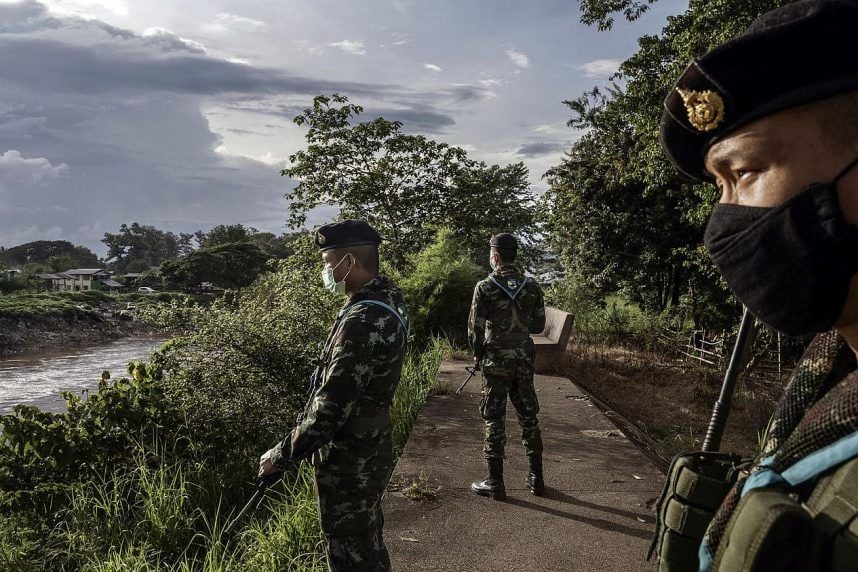‘Pig Butchering’ and Gambling Scams in SE Asia on the Rise
Posted on: June 30, 2023, 07:04h.
Last updated on: June 30, 2023, 09:05h.
A new report released this week by the US Institute of Peace (USIP) indicates that romance and illegal gambling scams operating out of areas like Myanmar in Southeast Asia may be getting worse. An “unholy alliance” between the Border Guard Force (BGF) in Myanmar and Chinese criminal organizations is leading to a “global security threat,” according to the report.

The report, “A Criminal Cancer Spreads in Southeast Asia,” takes a close look at the evolution of fraud in the region, highlighting Myanmar as a new major source of illegal activity. It asserts that Chinese criminal syndicates, with the help of the BGF, pose a global threat to internet users by engaging in cybercrime and financial fraud.
These organized crime groups operate along the border between Thailand and Myanmar, employing cyber-slavery to carry out their illicit activities. Where the groups previously sought to run their scams almost exclusively on Chinese nationals, they’re now branching out and going global.
Ignoring the Global Security Threat
China pushed the criminal groups and triads out of the country, and they sought refuge in countries in Southeast Asia, including in Cambodia, Laos, and Myanmar. There, they have established large compounds to conduct their activity.
Although the report highlights the “global security threat” of the groups and their activity, there has been minimal effort to curb the expansion of these illicit facilities. In a conversation with Voice of America, USIP Country Director Jason Tower warned that the organizations are now targeting virtually anyone and anywhere.
The criminal groups’ tactics have evolved beyond illegal casinos and quick cash-grab schemes. They now use a fresh strategy, “pig butchering,” which Tower describes as a scam designed to “fatten targets up before [financially] slaughtering them.”
Tower explained that this form of fraud has its roots in China. It revolves around the perpetrator gradually forming a profound connection with the victim online, often of a romantic nature.
As the relationship grows stronger, the scammer continues to convince the victim to hand over more money. Eventually, the fraudster takes it all and disappears.
The targets are not only Americans, but also individuals hailing from various parts of Europe, Japan, and several other nations across the globe, Tower emphasized.
These criminal gangs operate in areas that are strategically situated along a 31-mile segment running parallel to the Moei River, right at the border between Myanmar and Thailand. The USIP report reveals the existence of not less than 17 distinct crime regions encompassing more than 1,235 acres.
They’ve been able to flourish because the BGF, at the very least, allows them. It’s more likely, however, that the border-patrolling militia provides support in exchange for compensation.
Eyes in the Sky
The compounds the criminals maintain need people to operate them. This has led to an increase in human trafficking that regional leaders assert is being addressed.
Trafficking engulfs every nation, yet Southeast Asia noticeably harbors a greater share of victims. Consequently, the Association of Southeast Asian Nations (ASEAN) asserted at a summit in May that its members will take action.
To fill in the gaps the governments can’t manage, the International Justice Mission (IJM) has recently partnered with Maxar, a space technology company. It is now using innovative means of tracking criminal proliferation in the region.
https://twitter.com/IJMUK/status/1671765818277781504
The IJM shared a series of images spanning three years that were meticulously captured by Maxar’s Earth-observing satellites. They provide evidence supporting the existence and growth of the criminal groups.
Satellite methods, aside from orbit monitoring, offer additional means to expose the tragic reality of human trafficking. The IJM isn’t the only group helping to shed light on the global issue, with Stanford University also playing a part.
Stanford’s Human Trafficking Data Research Center leverages data from satellites, specifically those operated by Planet, a satellite company out of San Francisco, to carry out investigations on forced labor in regions affected by deforestation in Brazil’s Amazon rainforest.
Related News Articles
Crown Resorts May Have Fed Indonesian Governor’s Illegal Gambling Habit
Hong Kong Triad Boss Arrested During Illegal Gambling Raids
Philippines e-Sabong Scandal Leads to Charges Against PAGCOR Heads
Most Popular
FTC: Casino Resort Fees Must Be Included in Upfront Hotel Rates
Genovese Capo Sentenced for Illegal Gambling on Long Island
NBA Referees Expose Sports Betting Abuse Following Steve Kerr Meltdown
UPDATE: Former Resorts World & MGM Grand Prez Loses Gaming License
Most Commented
-
UPDATE: Whiskey Pete’s Casino Near Las Vegas Closes
— December 20, 2024 — 31 Comments -
Caesars Virginia in Danville Now Accepting Hotel Room Reservations
— November 27, 2024 — 9 Comments -
UPDATE: Former Resorts World & MGM Grand Prez Loses Gaming License
— December 19, 2024 — 8 Comments -
FTC: Casino Resort Fees Must Be Included in Upfront Hotel Rates
— December 17, 2024 — 7 Comments
















No comments yet